- Home
- Christopher Paolini
Brisingr Page 3
Brisingr Read online
Page 3
None of that could be blamed on Murtagh. He was a victim of fate, and had been since the day he was born.
And yet… Murtagh might serve Galbatorix against his will, and he might abhor the atrocities the king forced him to commit, but some part of him seemed to revel in wielding his newfound power. During the recent engagement between the Varden and the Empire on the Burning Plains, Murtagh had singled out the dwarf king, Hrothgar, and slain him, although Galbatorix had not ordered Murtagh to do so. He had let Eragon and Saphira go, yes, but only after defeating them in a brutal contest of strength and then listening to Eragon plead for their freedom.
And Murtagh had derived entirely too much pleasure from the anguish he inflicted upon Eragon by revealing they were both sons of Morzan—first and last of the thirteen Dragon Riders, the Forsworn, who had betrayed their compatriots to Galbatorix.
Now, four days after the battle, another explanation presented itself to Eragon: Perhaps what Murtagh enjoyed was watching another person shoulder the same terrible burden he had carried his whole life.
Whether or not that was true, Eragon suspected Murtagh had embraced his new role for the same reason that a dog who has been whipped without cause will someday turn and attack his master. Murtagh had been whipped and whipped, and now he had his chance to strike back at a world that had shown him little enough kindness.
Yet no matter what good might still flicker in Murtagh’s breast, he and Eragon were doomed to be mortal enemies, for Murtagh’s promises in the ancient language bound him to Galbatorix with unbreakable fetters and would forevermore.
If only he hadn’t gone with Ajihad to hunt Urgals underneath Farthen Dûr. Or if I had just been a little faster, the Twins—
Eragon, said Saphira.
He caught himself and nodded, grateful for her intervention. Eragon did his best to avoid brooding upon Murtagh or their shared parents, but such thoughts often waylaid him when he least expected it.
Drawing and releasing a slow breath to clear his head, Eragon tried to force his mind back to the present but could not.
The morning after the massive battle on the Burning Plains—when the Varden were busy regrouping and preparing to march after the Empire’s army, which had retreated several leagues up the Jiet River—Eragon had gone to Nasuada and Arya, explained Roran’s predicament, and sought their permission to help his cousin. He did not succeed. Both women vehemently opposed what Nasuada described as “a harebrained scheme that will have catastrophic consequences for everyone in Alagaësia if it goes awry!”
The debate raged on for so long, at last Saphira had interrupted with a roar that shook the walls of the command tent. Then she said, I am sore and tired, and Eragon is doing a poor job of explaining himself. We have better things to do than stand around yammering like jackdaws, no? … Good, now listen to me.
It was, reflected Eragon, difficult to argue with a dragon.
The details of Saphira’s remarks were complex, but the underlying structure of her presentation was straightforward. Saphira supported Eragon because she understood how much the proposed mission meant to him, while Eragon supported Roran because of love and family, and because he knew Roran would pursue Katrina with or without him, and his cousin would never be able to defeat the Ra’zac by himself. Also, so long as the Empire held Katrina captive, Roran—and through him, Eragon—was vulnerable to manipulation by Galbatorix. If the usurper threatened to kill Katrina, Roran would have no choice but to submit to his demands.
It would be best, then, to patch this breach in their defenses before their enemies took advantage of it.
As for the timing, it was perfect. Neither Galbatorix nor the Ra’zac would expect a raid in the center of the Empire when the Varden were busy fighting Galbatorix’s troops near the border of Surda. Murtagh and Thorn had been seen flying toward Urû’baen—no doubt to be chastised in person—and Nasuada and Arya agreed with Eragon that those two would probably then continue northward to confront Queen Islanzadí and the army under her command once the elves made their first strike and revealed their presence. And if possible, it would be good to eliminate the Ra’zac before they started to terrorize and demoralize the Varden’s warriors.
Saphira had then pointed out, in the most diplomatic of terms, that if Nasuada asserted her authority as Eragon’s liegelord and forbade him from participating in the sortie, it would poison their relationship with the sort of rancor and dissent that could undermine the Varden’s cause. But, said Saphira, the choice is yours. Keep Eragon here if you want. However, his commitments are not mine, and I, for one, have decided to accompany Roran. It seems like a fine adventure.
A faint smile touched Eragon’s lips as he recalled the scene.
The combined weight of Saphira’s declaration and her impregnable logic had convinced Nasuada and Arya to grant their approval, albeit grudgingly.
Afterward, Nasuada had said, “We are trusting your judgment in this, Eragon, Saphira. For your sake and ours, I hope this expedition goes well.” Her tone left Eragon uncertain whether her words represented a heartfelt wish or a subtle threat.
Eragon had spent the rest of that day gathering supplies, studying maps of the Empire with Saphira, and casting what spells he felt were necessary, such as one to thwart attempts by Galbatorix or his minions to scry Roran.
The following morning, Eragon and Roran had climbed onto Saphira’s back, and she had taken flight, rising above the orange clouds that stifled the Burning Plains and angling northeast. She flew nonstop until the sun had traversed the dome of the sky and extinguished itself behind the horizon and then burst forth again with a glorious conflagration of reds and yellows.
The first leg of their journey carried them toward the edge of the Empire, which few people inhabited. There they turned west toward Dras-Leona and Helgrind. From then on, they traveled at night to avoid notice by anyone in the many small villages scattered across the grasslands that lay between them and their destination.
Eragon and Roran had to swathe themselves in cloaks and furs and wool mittens and felted hats, for Saphira chose to fly higher than the icebound peaks of most mountains—where the air was thin and dry and stabbed at their lungs—so that if a farmer tending a sick calf in the field or a sharp-eyed watchman making his rounds should happen to look up as she passed overhead, Saphira would appear no larger than an eagle.
Everywhere they went, Eragon saw evidence of the war that was now afoot: camps of soldiers, wagons full of supplies gathered into a bunch for the night, and lines of men with iron collars being led from their homes to fight on Galbatorix’s behalf. The amount of resources deployed against them was daunting indeed.
Near the end of the second night, Helgrind had appeared in the distance: a mass of splintered columns, vague and ominous in the ashen light that precedes dawn. Saphira had landed in the hollow where they were now, and they had slept through most of the past day before beginning their reconnaissance.
A fountain of amber motes billowed and swirled as Roran tossed a branch onto the disintegrating coals. He caught Eragon’s look and shrugged. “Cold,” he said.
Before Eragon could respond, he heard a slithering scraping sound akin to someone drawing a sword.
He did not think; he flung himself in the opposite direction, rolled once, and came up into a crouch, lifting the hawthorn staff to deflect an oncoming blow. Roran was nearly as fast. He grabbed his shield from the ground, scrambled back from the log he had been sitting on, and drew his hammer from his belt, all in the span of a few seconds.
They froze, waiting for the attack.
Eragon’s heart pounded and his muscles trembled as he searched the darkness for the slightest hint of motion.
I smell nothing, said Saphira.
When several minutes elapsed without incident, Eragon pushed his mind out over the surrounding landscape. “No one,” he said. Reaching deep within himself to the place where he could touch the flow of magic, he uttered the words “Brisingr raudhr!” A pale red we
relight popped into existence several feet in front of him and remained there, floating at eye level and painting the hollow with a watery radiance. He moved slightly, and the werelight mimicked his motion, as if connected to him by an invisible pole.
Together, he and Roran advanced toward where they’d heard the sound, down the gulch that wound eastward. They held their weapons high and paused between each step, ready to defend themselves at any moment. About ten yards from their camp, Roran held up a hand, stopping Eragon, then pointed at a plate of shale that lay on top of the grass. It appeared conspicuously out of place. Kneeling, Roran rubbed a smaller fragment of shale across the plate and created the same steely scrape they had heard before.
“It must have fallen,” said Eragon, examining the sides of the gulch. He allowed the werelight to fade into oblivion.
Roran nodded and stood, brushing dirt from his pants.
As he walked back to Saphira, Eragon considered the speed with which they had reacted. His heart still contracted into a hard, painful knot with each beat, his hands shook, and he felt like dashing into the wilderness and running several miles without stopping. We wouldn’t have jumped like that before, he thought. The reason for their vigilance was no mystery: every one of their fights had chipped away at their complacency, leaving behind nothing but raw nerves that twitched at the slightest touch.
Roran must have been entertaining similar thoughts, for he said, “Do you see them?”
“Who?”
“The men you’ve killed. Do you see them in your dreams?”
“Sometimes.”
The pulsing glow from the coals lit Roran’s face from below, forming thick shadows above his mouth and across his forehead and giving his heavy, half-lidded eyes a baleful aspect. He spoke slowly, as if he found the words difficult. “I never wanted to be a warrior. I dreamed of blood and glory when I was younger, as every boy does, but the land was what was important to me. That and our family…. And now I have killed…. I have killed and killed, and you have killed even more.” His gaze focused on some distant place only he could see. “There were these two men in Narda…. Did I tell you this before?”
He had, but Eragon shook his head and remained silent.
“They were guards at the main gate…. Two of them, you know, and the man on the right, he had pure white hair. I remember because he couldn’t have been more than twenty-four, twenty-five. They wore Galbatorix’s sigil but spoke as if they were from Narda. They weren’t professional soldiers. They were probably just men who had decided to help protect their homes from Urgals, pirates, brigands…. We weren’t going to lift a finger against them. I swear to you, Eragon, that was never part of our plan. I had no choice, though. They recognized me. I stabbed the white-haired man underneath his chin…. It was like when Father cut the throat of a pig. And then the other, I smashed open his skull. I can still feel his bones giving way…. I remember every blow I’ve landed, from the soldiers in Carvahall to the ones on the Burning Plains…. You know, when I close my eyes, sometimes I can’t sleep because the light from the fire we set in the docks of Teirm is so bright in my mind. I think I’m going mad then.”
Eragon found his hands gripping the staff with such force, his knuckles were white and tendons ridged the insides of his wrists. “Aye,” he said. “At first it was just Urgals, then it was men and Urgals, and now this last battle…. I know what we do is right, but right doesn’t mean easy. Because of who we are, the Varden expect Saphira and me to stand at the front of their army and to slaughter entire battalions of soldiers. We do. We have.” His voice caught, and he fell silent.
Turmoil accompanies every great change, said Saphira to both of them. And we have experienced more than our share, for we are agents of that very change. I am a dragon, and I do not regret the deaths of those who endanger us. Killing the guards in Narda may not be a deed worthy of celebration, but neither is it one to feel guilty about. You had to do it. When you must fight, Roran, does not the fierce joy of combat lend wings to your feet? Do you not know the pleasure of pitting yourself against a worthy opponent and the satisfaction of seeing the bodies of your enemies piled before you? Eragon, you have experienced this. Help me explain it to your cousin.
Eragon stared at the coals. She had stated a truth that he was reluctant to acknowledge, lest by agreeing that one could enjoy violence, he would become a man he would despise. So he was mute. Across from him, Roran appeared similarly affected.
In a softer voice, Saphira said, Do not be angry. I did not intend to upset you…. I forget sometimes that you are still unaccustomed to these emotions, while I have fought tooth and nail for survival since the day I hatched.
Rising to his feet, Eragon walked to their saddlebags and retrieved the small earthenware jar Orik had given him before they parted, then poured two large mouthfuls of raspberry mead down his gullet. Warmth bloomed in his stomach. Grimacing, Eragon passed the jar to Roran, who also partook of the concoction.
Several drinks later, when the mead had succeeded in tempering his black mood, Eragon said, “We may have a problem tomorrow.”
“What do you mean?”
Eragon directed his words toward Saphira as well. “Remember how I said that we—Saphira and I—could easily handle the Ra’zac?”
“Aye.”
And so we can, said Saphira.
“Well, I was thinking about it while we spied on Helgrind, and I’m not so sure anymore. There are almost an infinite number of ways to do something with magic. For example, if I want to light a fire, I could light it with heat gathered from the air or the ground; I could create a flame out of pure energy; I could summon a bolt of lightning; I could concentrate a raft of sunbeams into a single point; I could use friction; and so forth.”
“So?”
“The problem is, even though I can devise numerous spells to perform this one action, blocking those spells might require but a single counterspell. If you prevent the action itself from taking place, then you don’t have to tailor your counterspell to address the unique properties of each individual spell.”
“I still don’t understand what this has to do with tomorrow.”
I do, said Saphira to both of them. She had immediately grasped the implications. It means that, over the past century, Galbatorix—
“—may have placed wards around the Ra’zac—”
—that will protect them against—
“—a whole range of spells. I probably won’t—”
—be able to kill them with any—
“—of the words of death I was taught, nor any—”
—attacks that we can invent now or then. We may—
“—have to rely—”
“Stop!” exclaimed Roran. He gave a pained smile. “Stop, please. My head hurts when you do that.”
Eragon paused with his mouth open; until that moment, he had been unaware that he and Saphira were speaking in turn. The knowledge pleased him: it signified that they had achieved new heights of cooperation and were acting together as a single entity—which made them far more powerful than either would be on their own. It also troubled him when he contemplated how such a partnership must, by its very nature, reduce the individuality of those involved.
He closed his mouth and chuckled. “Sorry. What I’m worried about is this: if Galbatorix has had the foresight to take certain precautions, then force of arms may be the only means by which we can slay the Ra’zac. If that’s true—”
“I’ll just be in your way tomorrow.”
“Nonsense. You may be slower than the Ra’zac, but I have no doubt you’ll give them cause to fear your weapon, Roran Stronghammer.” The compliment seemed to please Roran. “The greatest danger for you is that the Ra’zac or the Lethrblaka will manage to separate you from Saphira and me. The closer we stay together, the safer we’ll all be. Saphira and I will try to keep the Ra’zac and Lethrblaka occupied, but some of them may slip past us. Four against two are only good odds if you’re among the four.”
&nb
sp; To Saphira, Eragon said, If I had a sword, I’m sure I could slay the Ra’zac by myself, but I don’t know if I can beat two creatures who are quick as elves, using nothing but this staff.
You were the one who insisted on carrying that dry twig instead of a proper weapon, she said. Remember, I told you it might not suffice against enemies as dangerous as the Ra’zac.
Eragon reluctantly conceded the point. If my spells fail us, we will be far more vulnerable than I expected…. Tomorrow could end very badly indeed.
Continuing the strand of conversation he had been privy to, Roran said, “This magic is a tricky business.” The log he sat on gave a drawn-out groan as he rested his elbows on his knees.
“It is,” Eragon agreed. “The hardest part is trying to anticipate every possible spell; I spend most of my time asking how can I protect myself if I’m attacked like this and would another magician expect me to do that.”
“Could you make me as strong and fast as you are?”
Eragon considered the suggestion for several minutes before saying, “I don’t see how. The energy needed to do that would have to come from somewhere. Saphira and I could give it to you, but then we would lose as much speed or strength as you gained.” What he did not mention was that one could also extract energy from nearby plants and animals, albeit at a terrible price: namely, the deaths of the smaller beings whose life force you drew upon. The technique was a great secret, and Eragon felt that he should not reveal it lightly, if at all. Moreover, it would be of no use to Roran, as too little grew or lived on Helgrind to fuel a man’s body.

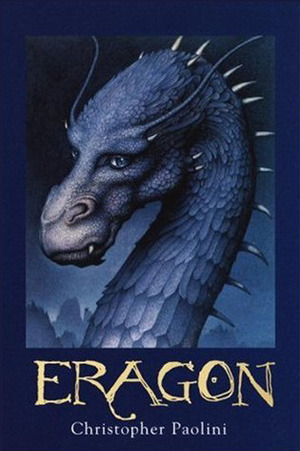 Eragon
Eragon Eldest
Eldest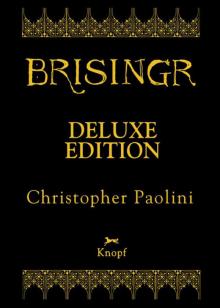 Brisingr
Brisingr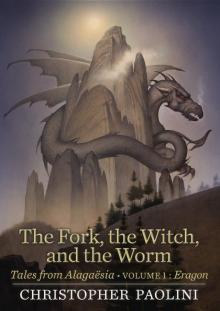 The Fork, the Witch, and the Worm
The Fork, the Witch, and the Worm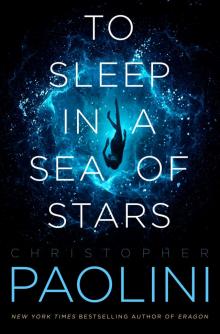 To Sleep in a Sea of Stars
To Sleep in a Sea of Stars![Eldest [en] i-2 Read online](http://i1.bookreadfree.com/i/03/19/eldest_en_i-2_preview.jpg) Eldest [en] i-2
Eldest [en] i-2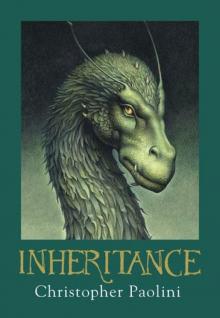 Inheritance i-4
Inheritance i-4![Brisingr [en] i-3 Read online](http://i1.bookreadfree.com/i1/03/31/brisingr_en_i-3_preview.jpg) Brisingr [en] i-3
Brisingr [en] i-3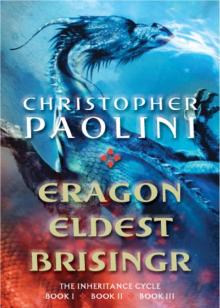 Inheritance Cycle Omnibus
Inheritance Cycle Omnibus